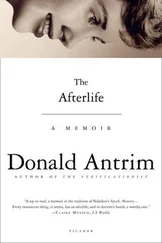Here came the ceiling. I didn’t dare look. I breathed the smells rising off Bernhardt, his shaving lotion and bad clothes, the man’s rich scent of flowers dying in old water.
Was he hard?
As I grow older, I find that sexual excitation does not necessarily result in erection, per se, but in a roiling, washing, deep-in-the-pelvis warmth, as if the body has learned, over the years since adolescence and early manhood, to slow its responses, to suspend, dramatically, the sexual act and its completion, and instead remain, somewhat restfully, somewhat fitfully, in a condition of lovely, lingering anticipation. Then time decelerates, and this is a blessing. Those of us in middle or late age are by now familiar with the quickening hours, the faster and faster rushing past of days, months, the seasons of life. What’s a year anymore? It is sex, I have found— sex! — or, more precisely, this state of being in awareness of sex, that gives a solid check against the clock, a countermeasure, in the brain, to the rapidity of the body’s decline toward weakness, disease, senescence. If you think about what I am saying, if you concentrate on it, you will certainly recall, in your own experience, those precious moments that stand so alone in time: the glance across a room at the man or woman who will become the new lover: a kiss anticipated: the kiss.
The sun had descended outside and sex was everywhere around me. The kitchen doors swung open and a waitress, lit from behind by super-radiant, industrial-strength fluorescence, came through with a coffeepot in one hand and milk, one of those small stainless-steel creamers, held high before her in the other. She looked young; I flew down for a better view. Light spilled from kitchen to dining room, causing this waitress’s medium-length skirt, as she entered, to become, briefly, translucent. Outlines of her legs showed. The girl’s hair, ribboned, backlit, and fair, glowed in the light that framed her shadow thrown before her on the floor. I was not the only man watching the girl, her body in light. It was as if that light from the kitchen had been set up and aimed to capture this entrance with milk and coffee. Then the waitress, taking her time, admired by men, hesitated a moment while the swinging doors closed behind her. One door, then the next, on her left, then her right, clicked on its hinges, tipped shut. She did not look down or backward toward the doors. She stared ahead into the dining room and her shadow on the floor vanished as doors closed and there was no way to tell what she might have been thinking. Her dress reasserted itself and became opaque and plain around her. She knew where the doors were and she let them go and that ended our show.
“Tom.”
“What?”
“Stop shaking.”
It was Bernhardt speaking quietly to me, whispering kind words to make my fear go away. I grasped his hands tightly in mine. I was glad to be held. I felt that if set down, I might crumple over and fall from the heights and absolutely collapse. I said to the man, “Don’t let go of me,” and he promised, “I won’t.” Then Bernhardt hoisted me higher in his arms, a quick little lift as he tossed me around, shifting his own posture while readjusting the load — me, that is — in order to get better purchase, a more comfortable grip.
I can say in fairness that at that point, in that instant of being shaken around and arranged in Bernhardt’s arms, I felt truly and strangely like a young child, myself as a child at, I would guess, roughly eighteen or twenty months in age. What I mean is that I felt the man’s authority, his enormous strength. How did this come about? My own position, hoisted aloft in midair, was one of relative powerlessness. Yet this powerlessness, or helplessness, my lack of volition, my childlike perspective, whatever we want to call it, was in fact a complex state, in that it was not at all what it seemed; on the contrary, I was, in the ways that children can be, quite powerful, because I was free during those moments suspended in Bernhardt’s arms, free to see the world as a place of my own making.
Richard Bernhardt, in spite of — because of — his most sinister qualities, his pressing, carnal threat, was doing a wonderful job accommodating my deepest longings and torments.
You see, that night at the Pancake House, perched high with feet hanging and my head rising upward to float closer and closer to the ceiling and lights, I felt, for a short while, as if I were becoming what every normal child most truly is: an inventor of reality.
I did what any average, middle-aged man might do in this situation. I tried to make eye contact with a mature woman.
I turned my gaze away from the youthful waitress standing so beautifully before the kitchen doors, away from other diners staring at this girl or huddled, more or less oblivious, in friendly alliances around square tables covered with blue cloths. The jukebox music played. There was talking and laughing, a quiet turmoil of noise made by people who looked and sounded as if they were pleased to be done with the day and out of the house. What were they all talking about? They appeared, my friends in their socioprofessional cliques, infatuated with one another. In particular there was, at one table, a great amount of interest in whatever Sherwin Lang was saying. Lang, like many alcoholics, is intelligent and a great pontificator; he is one of those lovely, well-preserved drunks whose talk is never boring and always — for reasons I can never quite pin down, though undoubtedly related to his sonorous, low-pitched speaking voice — always comforting. It is probably true that for some, the man’s alcoholism makes him attractive; he has the bearing of a rake or a lost father, and naturally this causes women to fall precipitously in love with him. I have to admit that he is one of my favorite people. Tonight his table companions were listening intently to him, and who could blame them? “Take spaceships and unidentified flying objects,” he was saying now over buckwheat pancakes and a bottled beer, his third or maybe fourth. “In my view, these are perfect instances of the phenomenon we’re concerned with. What are spaceships if not ideal, visionary mislocations of human erotic desire? The existence or nonexistence of flying saucers is finally immaterial. Read Jung on this if you can stand reading Jung.” He chuckled and let his companions acknowledge, with their own show of polite mirth, his preeminence as a thinker on matters relating to psychoanalytic doctrine and the canon; then he continued, “What matters to the true believer are the structures of longing and paranoia surrounding the various controversies and all those, you know, those suspected conspiracies and whatnot that make up what passes for narrative in this issue. Neither saucers nor government cover-ups can be satisfactorily confirmed, and therefore the entire debate operates at the level of exciting metaphor.”
“Dr. Lang, are you saying that people have UFO sightings as a substitute for working through their sexual hysterias?” The speaker was Leslie Constant, a third-year postdoctoral Institute trainee who had come to us from England, where she had grown disenchanted, understandably, with traditional British Object Relations Theory.
Sherwin drank from his beer, then went on in his accustomed manner of the scholarly dignitary granting an interview, “Well, not exactly, though I think it is pretty generally accepted that forbidden sexuality will express itself in complex, often frightening belief systems.”
“Like religion?” prompted Leslie.
The table went quiet; it was possible that Leslie’s question was too general, too obvious; was, in other words, a breach of academic decorum and restraint. Sherwin sipped again from his beer. His movements when he drank — the hand outstretched though clearly comfortable and relaxed, gliding along through space toward the glass bottle; and his long fingers showing, as his hand progressed toward the beer, their handsome nails; and then the fingers softly, gently, affectionately touching the dark glass, encircling and clasping it, feeling it; finally, hand and arm working together to raise, neither recklessly quickly nor conspicuously slowly, in other words not evidently self-consciously from an onlooker’s point of view, the precious, all-important amber bottle — were movements made by a man intensely concentrated, at least whenever watched while drinking, on physical precision and the demonstration, acted out almost as a performance, of sobriety, dignity, and masculine beauty. He drank. The force of his personality was awesome. I have often surmised that this may have been a function less of his intellect than of his hair, swept back from the high forehead in a great black-and-gray mane that put one in mind of a nineteenth-century mathematician or poet-philosopher. His coat as well was cut in a style that looked antiquated somehow, snug at the waist and featuring narrow lapels riding out at severe angles from a four-button front that fully cloaked most of his exquisite wine-red tie. Sherwin’s colleagues around the table nodded their heads while he told them, “Religion as ritualized communal orgasm — so much has been written on this. But, you know, religious practice is not primarily useful as a gateway to ecstatic states. Rapture is for the mystics and shamans and snake handlers, right? I think most observance is really more a way of conceptualizing day-to-day life as what it actually is for many people, a progress of meaningful failures.”
Читать дальше












